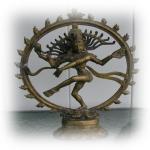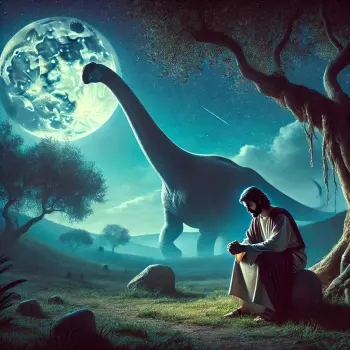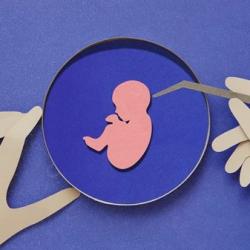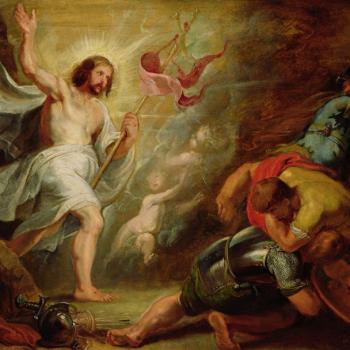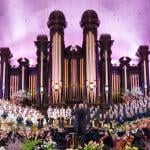Francisco Ayala 1934-2023
Patheos SR 5023
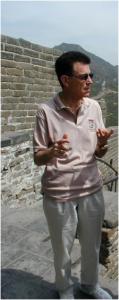
Take a look at this photo of Francisco Ayala (1934-2023). This is the day Francisco learned that he had won the National Medal of Science. During the spring of 2002, Francisco along with some scholars from the Center for Theology and the Natural Sciences (CTNS) in Berkeley were on a lecture tour in the Peoples Republic of China. As you can see, Francisco is standing atop the Great Wall of China. My photo was taken as he was announcing that he’d received a telephone call that morning from the White House in the U.S.
When we returned from China, Franciso went to Washington D.C. On June 12, 2002, President George W. Bush awarded him the National Medal of Science at the White House.
Francisco died in his sleep this past week at the age of 89. His was a distinguished career as a researcher and teacher. He had been University Professor and Donald Bren Professor of Biological Sciences at the University of California, Irvine.
I first met Francisco in the early 1990s in Washington. At that time I was serving as Principal Investigator and a research project funded by the National Institutes of Health dealing with the theological and ethical implications of the Human Genome Project. Francisco, then President of the American Association for the Advancement of Science made a presentation. Later I would come to know him better when he connected with CTNS the Graduate Theological Union in Berkeley.
Having studied theology in his native Spain before becoming an American research scientist, Francisco was nearly unique in providing religious support for science in the public square. As an evolutionary biologist and geneticist, he sought to protect the teaching of evolution in the public schools from the assault mounted by creationism and Intelligent Design. He firmly believed that an authentic understanding of Charles Darwin’s theory of evolution could become a blessing for people in the churches, so he penned a book, Darwin’s Gift to Science and Religion.
“Yes, one can believe in both evolution and God” (Ayala, 2007, 202).
In his tribute, Lawrence Krauss tells readers: “A great scientist, scholar, and gentleman, we worked together to defend the teaching of evolution, including convincing the Catholic Church not to abandon it.”
Francisco Ayala & Theistic Evolution
My Berkeley colleague and friend, Robert John Russell, and I belong to a club we call Theistic Evoution. Francisco belonged to this club as well.
“I am convinced that evolution and religious beliefs need not be in contradiction. Indeed, if science and religion are properly understood, they cannot be in contradiction because they concern different matters. Science and religion are like two different windows for looking at the world….Science concerns the processes that account for the natural world…Religion concerns the meaning and purpose of the world and human life, the proper relation of people to the Creator and to each other, the moral values that inspire and govern people’s lives” (Ayala, 2010, 73, Ayala’s italics).
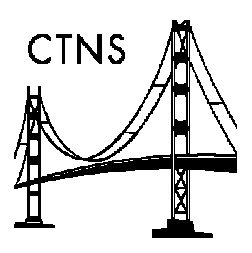 Which model for relating science and religion does Francisco embrace? As you can see from his allusion to “two windows,” Ayala belongs squarely in the camp Ian Barbour (Barbour, 1977, 84-89) labeled, “Indepdence.” I label it the “Two Languages” model (Peters, 2017, 14-15). Science speaks the language of facts about nature. Religion speaks the language of meaning, value, and transcendence. Human civilization needs to be bi-lingual, so to speak.
Which model for relating science and religion does Francisco embrace? As you can see from his allusion to “two windows,” Ayala belongs squarely in the camp Ian Barbour (Barbour, 1977, 84-89) labeled, “Indepdence.” I label it the “Two Languages” model (Peters, 2017, 14-15). Science speaks the language of facts about nature. Religion speaks the language of meaning, value, and transcendence. Human civilization needs to be bi-lingual, so to speak.
Robert John Russell, in comparision, demands more. Russell’s model is Creative Mutual Interaction (CMI). Rather than separate science and religion into to two noncompossible languages, Russell contends that God works “in, with, and through” evolutionary processes. Ayala and Russell are similar, to be sure; yet, they work with slightly different methodological models.
As you can see from the logo with the Golden Gate Bridge, CTNS is constructing a sturdy bridge where traffic goes two directions: from science to theology and back from theology to science.
“In many ways the bridge is now complete, and we can concentrate fully on the rich opportunities and challenges brought on by the flow of knowledge and vision in both directions across the bridge: the creative mutual interaction between theology and science” (Russell, 2008, 2).
Conclusion
Personally, I will miss Francisco J. Ayala. Francisco exhibited not only admirable competence but also high levels of wisdom, creativity, and patience. He sought reconciliation through mutual respect. Francisco J. Ayala was a gift to both the lab and the pew.
▓
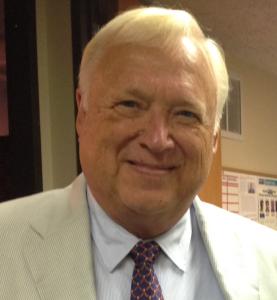
Ted Peters directs traffic at the intersection of science, religion, and ethics. For Patheos, he posts articles and notices in the field of Public Theology.
Peters is an emeritus professor at the Graduate Theological Union, where he co-edits the journal, Theology and Science, on behalf of the Center for Theology and the Natural Sciences, in Berkeley, California, USA. He authored Playing God? Genetic Determinism and Human Freedom? (Routledge, 2nd ed., 2002) as well as Science, Theology, and Ethics (Ashgate 2003). He is editor of AI and IA: Utopia or Extinction? (ATF 2019). Along with Arvin Gouw and Brian Patrick Green, he co-edited the new book, Religious Transhumanism and Its Critics hot off the press (Roman and Littlefield/Lexington, 2022). He has just published The Voice of Christian Public Theology (ATF 2022). See his website: TedsTimelyTake.com.
His fictional spy thriller, Cyrus Twelve, follows the twists and turns of a transhumanist plot.
▓
References
Ayala, Francisco J., 2007. Darwin’s Gift to Science and Religion. Washington DC: Joseph Henry Press.
Ayala, Francisco J., 2010. Am I a Monkey: Six Biq Questions about Evolution . Baltimore MD: Johns Hopkins University Press.
Barbour, Ian G., 1977. Religion and Science: Historical and Contemporary Issues. New York: Harper.
Peters, Ted, 2017. “Science and Religion: Ten Models of War, Truce, and Partnership.” Theology and Science 15:4; 1-43.
Russell, Robert John, 2008. Cosmology from Alpha to Omega: The Creative Mutual Interaction of Theology and Science . Minneapolis: Fortress Press.



